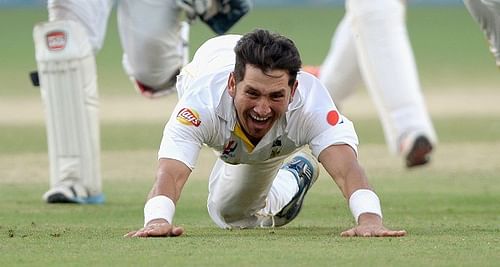
Pakistan to contest Yasir Shah's failed dope test
Pakistan have decided to appeal against the failed dope test that saw their ace spinner, Yasir Shah, being suspended from competitive cricket with immediate effect as soon as the news broke out on December 27, 2015.
Shah was found guilty of consuming chlorthalidone, a drug used to treat hypertension, after a dope test that was conducted on November 13 during the ODI series against England in the UAE. The aforementioned drug is on the list of banned substances released by the World Anti-Doping Agency (WADA) which the cricketers are prohibited from consumption.
These medicines are supposed to increase performance levels of the athletes consuming them, thereby giving them an unfair advantage and dissolving the level playing field that is expected in professional sports.
Since it was reported that the leggie had admitted to the consumption of the said drug in order to seek relief from hypertension, the Pakistan Cricket Board (PCB) has decided not to ask for another urine sample (Sample B) and instead challenge the verdict.
Shahryar Khan, the chairman of the board, said that after due consultations from the medical team they have decided not to ask for another sample. "We have decided not to go for the 'B' sample test, and instead, will appeal with the ICC," he told AFP.
The man who accounted for 15 wickets in Pakistan’s recent 2-0 victory over England has time until Sunday to either plead guilty or appeal against the charges. This development has come as a massive blow to Pakistan who were overly dependent on the spinner as he played a crucial role in their success against Sri Lanka as well where he grabbed 24 wickets in three Tests in July.
This hasn’t been the only such incident in recent times as in December itself, Sri Lankan wicketkeeper-batsman Kusal Perera had also failed the dope test after being found to have consumed a banned substance on the WADA’s list.
Sri Lanka’s cricket contingent had likewise come out in complete support of the batsman, had launched an investigation into the test and had even linked it with a match-fixing scandal.
If found guilty, both these cricketers can face a four-year ban.
Of late, Pakistan Cricket has been at the receiving end of a plethora of controversies. Their offspinner, and once the forerunner of their spin attack, Saeed Ajmal was reported for a suspect action in 2014, following which he had to remodel his action. However, Ajmal didn’t taste much success with the new action and was subsequently dropped from the team.
Also, the probability of return of the tainted left-arm fast bowler, Mohammad Amir, had created a spark that was catching fire by the day, which was extinguished to a large extent by the PCB, when they not only included him in the squad that tours New Zealand but also compelled his opposers to come to friendly terms, lest they face consequences.
